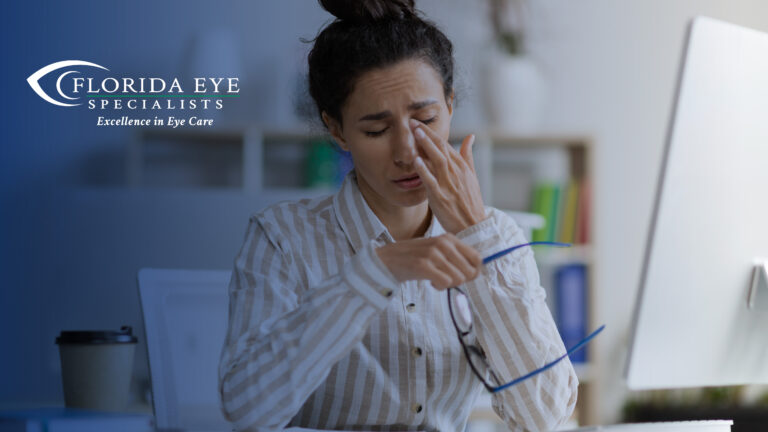Are you struggling with blurry vision that makes daily tasks like reading and driving difficult? You may be wondering—can dry eyes cause blurry vision? The answer is yes. When your eyes don’t produce enough quality tears, the surface becomes dry and unstable, leading to irritation and vision disturbances.
At Florida Eye Specialists, we understand how disruptive dry eye symptoms can be. The good news? You don’t have to live with irritated eyes or blurry vision. Learn how dry eye impacts vision, what other eye conditions may be responsible, and what treatments can help you see clearly again.
Can Dry Eyes Cause Blurry Vision?
When your eyes don’t produce enough quality tears to keep the surface properly lubricated, the tear film becomes unstable, leading to fluctuating vision, irritation, and discomfort. This condition, known as Dry Eye Syndrome, can also cause a gritty or burning sensation, making it difficult to focus.
Several factors can contribute to dry eye, including aging, prolonged screen time, certain medications, and environmental conditions such as wind or dry air. These factors can reduce tear production or cause tears to evaporate too quickly, making dry eye a common cause of blurry vision.
In addition to blurry vision, other symptoms of dry eye disease you might experience include:
- Burning, stinging, or scratchy sensations in the eyes
- Eye fatigue and redness
- Stringy mucus in or around the eyes
- Excessive watering (a reaction to dryness)
- Increased sensitivity to light
- A persistent feeling of having something in your eye
While dry eye can be painful and disruptive, several treatment options are available to help restore moisture, improve tear stability, and relieve symptoms.
Other Eye Conditions That May Cause Blurry Vision
Blurry vision can stem from a variety of medical conditions, ranging from temporary irritation to more serious diseases. Identifying the underlying cause is key to finding the right treatment and preserving your vision.
Cataracts
A cataract is the clouding of the eye’s natural lens, leading to blurred vision, glare sensitivity, and poor night vision. Cataracts develop gradually and are among the most common causes of vision loss in adults over 60.
Age-Related Macular Degeneration (AMD)
AMD is a leading cause of central vision loss in adults over 50. As the condition progresses, blurry or distorted central vision may develop, making activities like reading and driving more difficult.
Can Dry Eye Cause Blindness?
While the condition can cause discomfort and visual disturbances, it doesn’t typically lead to blindness. However, if left untreated or if the condition is severe, chronic dry eye can contribute to other eye conditions that might impact vision. Prolonged irritation and inflammation can damage the surface of the cornea (the clear front of the eye), leading to a condition called corneal ulceration or other vision problems.
Corneal ulcers can be painful and may cause vision disturbances, but with proper treatment, the risk of blindness is extremely low. It’s important to address symptoms promptly to prevent complications and maintain good eye health.
Can Dry Eyes Cause Headaches?
Yes, this condition can lead to occasional headaches. Dry eyes can struggle to focus adequately, particularly during prolonged reading or looking at screens. This can result in strain on the muscles of the eyes, leading to eye fatigue, which can then trigger tension headaches.
Additionally, the discomfort and irritation from dry eyes can contribute to overall discomfort, potentially worsening headache symptoms. If you’re experiencing frequent headaches along with painful eye symptoms, it might be time to consult with an eye care professional to determine if dry eyes are a contributing factor and to explore appropriate treatment options.
Best Eye Drops for Dry Eyes
There are many types of eye drops on the market to help combat dry eye symptoms. The most common eye drop treatments include artificial tears, gels, and ointments. The key is to choose preservative-free eye drops. That’s because preservatives can irritate the surface of your eye, causing the delicate material to break down, which can worsen your condition.
Here are five highly effective prescription eye drops for dry eye:
- Oasis Tears Plus
- Refresh Optive MEGA-3
- Optase Dry Eye Intense Drops
- Systane Ultra (Preservative-Free)
- Retaine MGD Eye Drops
Click here to read more about these drops.
Latest Treatment for Dry Eye in Jacksonville, FL
If you’re experiencing blurry vision, eye irritation, or dryness, don’t wait for symptoms to worsen. Schedule an appointment with Dr. Kimberly Riordan at our Dry Eye Center in Jacksonville, FL. Our experts will create a personalized treatment plan to help you see clearly and feel comfortable again.

